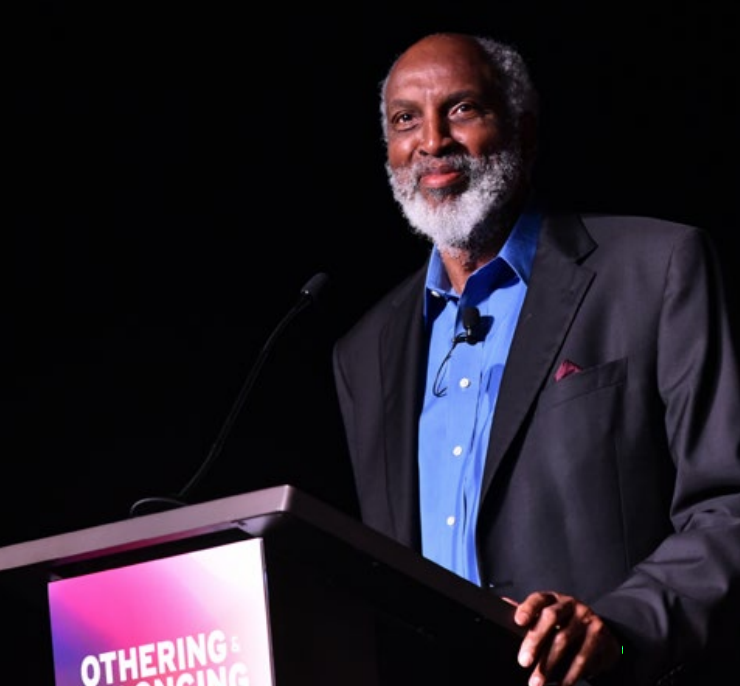Introduction From the Conference Chair
I am pleased to present this report about our remarkable 2019 Othering & Belonging Conference, which was held April 8–10 in Oakland, California. This detailed summary of the conference was produced for all who were part of its execution and success—sponsors, attendees, speakers, and our staff at the Haas Institute at UC Berkeley. It is also intended as a point of engagement for those who are interested in being part of future work and public events that are organized around our framework of belonging.
During my conference welcome remarks, I asked everyone to meet one another with the traditional Zulu greeting, "Sawubona," which means "I see you." In this saying, "seeing" means I see not only you, but your family, your community, those who came before you, and those who will follow you. It also means that I see a "you" who is also a part of me. As this greeting affirms, "seeing" is not just something done with the eyes, but also with our hearts and souls, and with validation and affirmation of our connection.
Yet many in our world today fail to practice this kind of deeper seeing. And too many of our leaders attempt to distort our view of other people, asking us to view those who have differences from us—whether across race, religion, sexual orientation, ability, political affiliation, or other perceived differences— with fear and suspicion; as threats rather than opportunities; as less than, rather than equal to; and as separate from, rather than connected to.
Disability justice advocate Haben Girma, in her opening keynote address at the conference, also made a point about truly seeing, speaking directly to the context of disability, ability, and possibility. Haben— who is both deaf and blind and has paved a path for herself through Harvard Law School, becoming a surfer and passionate salsa dancer—stated that disability should be seen as an opportunity for innovation and new forms of connection and communication. "Disabilities are not barriers," she noted. "Social attitudes and norms are what creates barriers."
Dr. Rev. William J. Barber, in his rousing closing keynote address, echoed the call to focus our sights on where our efforts truly matter—in our systems, structures, and policies. "Real racism is not what’s in your heart," he said, "but what’s in your systemic policies."
Indeed, how people are viewed, or made invisible, within systems and structures, is a core part of what the Othering and Belonging framework aims to illuminate. When institutions can only see the needs of some groups—thus ensuring their rights and protections—while those of other groups remain concealed or distorted, outcomes are deeply unequal and unjust.
Another main thread we held throughout the 2019 conference was the need for us to activate bridging as a response and formation in our times of increasing polarization and division. In these times, it is often easier to close ourselves off and engage in a politics of breaking, whether that be soft or hard breaking. But bridging allows us to fully see each other by insisting on our shared humanity. As was illustrated at the conference through the stories of those actively practicing it, bridging is not easy. And it must take place with people outside of our own groups, communities, and comfort zones in order for us to achieve a more radically inclusive space of belonging.
Thank you for your willingness to collaborate and co-create together with us during the 2019 conference. While this report highlights many examples of the conference’s positive impact, we know that the real measurement of its success will be in what we do next with what we learned and experienced together.
This gathering powerfully demonstrated that we’re not only fighting that which attempts to divide us, we’re also collectively reimagining new conceptions of belonging. The issues that facing us and our living planet cross boundaries and borders and the old ways of working may not be sufficient to tackle our current and future challenges. We need new ways of seeing and we need new ways of being. This is what Othering & Belonging is about.
As one attendee noted in their conference evaluation, "It feels like I’ve been given an entirely new way to view the world. My eyes are still adjusting.
Yours in belonging,
john a. powell
Director, Haas Institute for a Fair and Inclusive Society and Professor of Law, African American, and Ethnic Studies at UC Berkeley
"We need new ways of seeing and we need new ways of being. This is what Othering & Belonging is about."
–john a. powell



